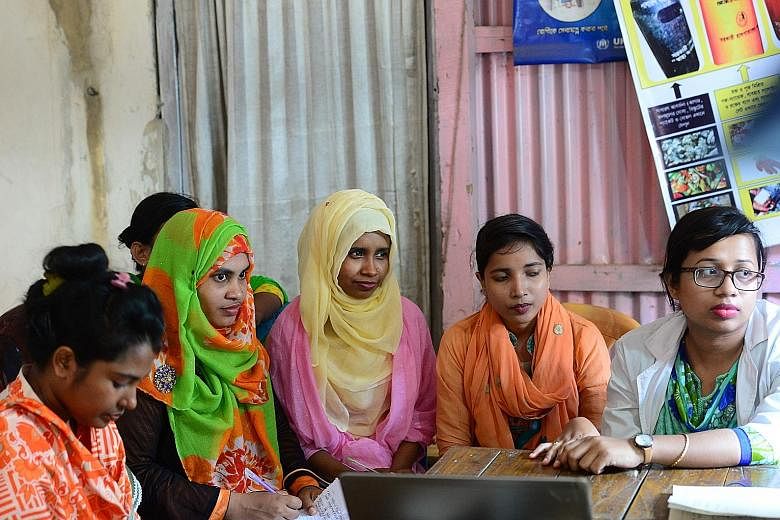COX'S BAZAR (Bangladesh) • Aid workers are scouring the world's largest refugee camp for pregnant Rohingya rape victims, with a rush of births anticipated nine months after Myanmar forces unleashed "a frenzy of sexual violence" against women and girls from the Muslim minority.
Specialists and Rohingya volunteers are racing against time to find women in the giant camp who are thought to be hiding their pregnancies out of shame, as fears grow that newborns could be abandoned and new mothers may die without care in coming weeks.
Ms Tosminara, herself a Rohingya refugee, has spent months coaxing these women out of the shadows, promising discretion.
"We tell them a password they can use when they arrive at the hospital or health post. The guard then sends the women directly to the right spot," said Ms Tosminara, who goes by one name.
The Myanmar army crackdown last August drove roughly 700,000 Rohingya into Bangladesh.
The number of pregnancies resulting from rape is not known. But United Nations Assistant Secretary-General for Human Rights Andrew Gilmour said there would inevitably be a spike in births soon given the "frenzy of sexual violence in August and September last year".
Ms Marcella Kraay of Doctors Without Borders (MSF) also said "a fair number of pregnancies" were expected. An estimated 48,000 women will give birth in the camp this year. Those who were raped will be delivering soon, mostly in secret and without medical care on the floors of bamboo shacks near the Bangladesh-Myanmar border.
Rohingya community leader Abdur Rahim said he knew two women who were raped by soldiers and due within the month. "The Myanmar military raped them. These babies are... evidence of their crimes."
Ms Tosminara said she is trying her best to find these women. But volunteers must contend with a deep-rooted stigma that keeps many from revealing their ordeal.
Many have sought clinical help to terminate pregnancies. Others have resorted to underground options resulting in "complicated, incomplete abortions", said MSF midwife Daniela Sofia. Ms Sofia assisted a 16-year-old with an abortion after she arrived at her clinic in secret, terrified her family would find out. She said the girl had been gang-raped by Myanmar soldiers.
More than half of the Rohingya people who have fled into Bangladesh are women and girls.
Ms Emu Roy, a Bangladeshi midwife, said a paucity of maternity professionals made it difficult to know how many women were suffering in silence in the camp. "It's not possible for us to go door to door."
Experts are concerned that families could forcibly marry off teenage girls to cover up pregnancies. Others fear that newborns could be abandoned. MSF alone treated 311 rape victims between last August and March but Ms Kraay said this was "the tip of the iceberg".
The Myanmar army chief has denied allegations his forces used rape to terrorise the Muslim minority. But the military last month was placed on a UN blacklist for armies and rebels known to use rape in war.
AGENCE FRANCE-PRESSE

